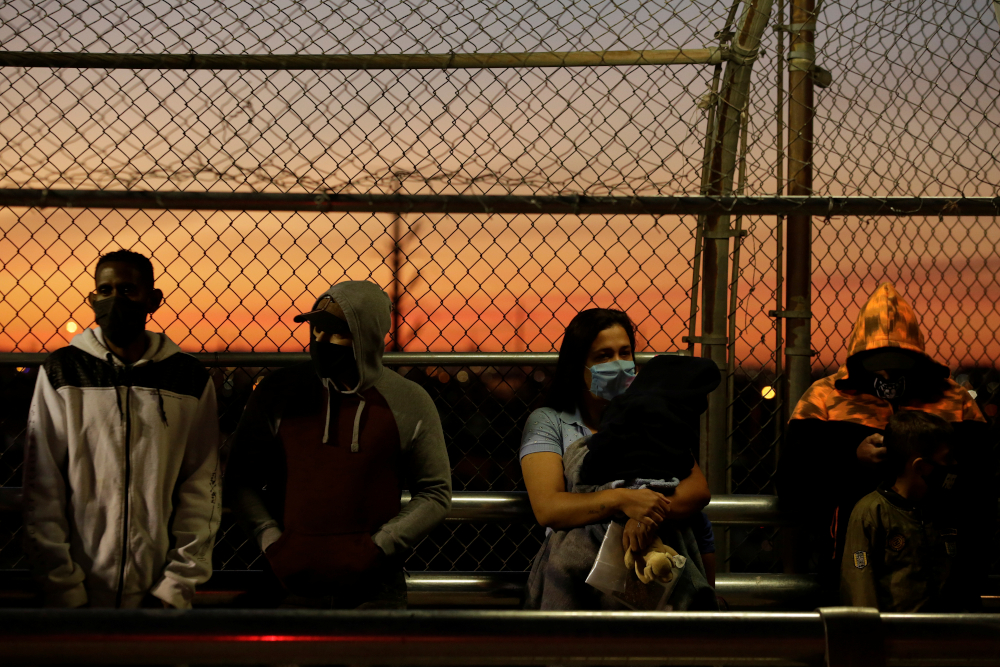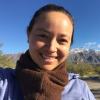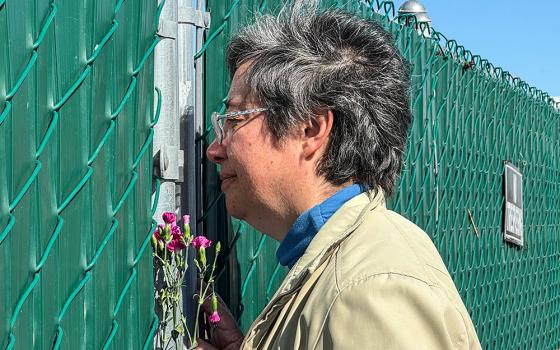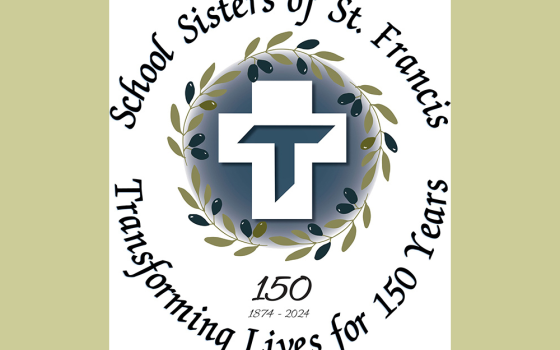
Migrants in the "Remain in Mexico" program line up at the Paso del Norte Mexico-U.S. border bridge in Ciudad Juarez, Mexico, April 21 to reschedule their United States immigration hearings during the coronavirus pandemic. (CNS/Reuters/Jose Luis Gonzalez)
It was the adventure of a lifetime. My friend Karen and I decided to take time out from our Spanish studies in Quetzaltenango, Guatemala, to travel around the country for a week. Somehow, with my limited Spanish, we had made it to Livingston, a town on the east coast known for its African-influenced culture.
We were both pretty open to whatever experiences the journey laid in front of us, so when a young English-speaking man offered to give us a tour of the town, we agreed without much hesitation. Another woman from the United States joined us on the tour. As we made our way through a grassy field toward one of the town's beautiful beaches, it dawned on me that it was July 4.
Although we were in a different country, I thought we U.S. Americans should still acknowledge the occasion.
"Hey, it's Independence Day! Happy Fourth of July!" I yelled out to my U.S. American comrades.
The other woman on the tour with us turned around and said, "Not all of us celebrate. Not all of us are free."
My 20-year-old self couldn't understand why a Black woman would harbor such feelings. I remember thinking, "Slavery is over. Why can't she just move on?" I giggled at her reaction, and it became a running joke for Karen and me.
It's painful for me to acknowledge this incident and my callousness in the face of another's real hurt, lived at the expense of my privilege. At that time in my life, I assumed that my white experience was the common experience. I was just beginning to touch the complexities of what it means to be U.S. American and why some people, now myself included, hesitate to embrace that identity and its history of oppressive implications.
My experience living at the Mexico-U.S. border has added to the hypocrisy I see in our country's pledge to stand for "liberty and justice for all." Supposed "closure" of the Mexico-U.S. border to nonessential travel since March has made it clear that this "liberty and justice" doesn't apply to everyone.
Government officials claimed this closure was for the purpose of limiting the spread of COVID-19. Yet for weeks after the Trump administration announced it would close the border for this reason, U.S. Customs and Border Protection officers at the ports of entry processed hundreds of people each day without wearing face masks and continued to stand around in clusters of 10 to 15 people. This same reported concern about the spread of COVID-19 has not prevented the daily deportation of people from U.S. detention centers to Mexico and Central American countries without any testing for the virus. In some cases, these deportations have been the sole cause for the spread of COVID-19 to some remote areas that may never have seen these cases otherwise.
Advertisement
Although many see the Statue of Liberty as a symbol of what it means to be U.S. American, her words "give me your tired, your poor, your huddled masses yearning to breathe free" fall flat in the face of the U.S. government's selective border closure. We'll allow for essential travel, they say; that is, essential travel defined on our terms.
A month ago, I got in my car and headed to the port of entry with a friend. As we waited in line to cross from Mexico to the United States, I was nervous that our excursion would not fly under the nonessential travel restrictions. In fact, I was very clear that what we were doing was not essential by any stretch of the imagination: We wanted to go for a hike at a park on the U.S. side. When my friend announced to the Border Patrol officer that this was our plan, he simply nodded his head, unquestioningly. After all, we were two white U.S. Americans with passports. Somehow, this was essential travel.
This weighs on me every time I greet the people who show up at the Kino Border Initiative's migrant aid center. I look into their eyes, calling to mind some of their stories of fleeing violence and persecution, their courage to fight for their lives and the lives of their families, and knowing that the U.S. government does not consider their passage into the United States to seek asylum as "essential travel." I can't help but wonder if this travel would be considered as "essential" if these asylum-seekers were white, if they were coming from Europe. We extend liberty and justice when it's convenient, when it's politically expedient. And whatever consequences of this selective exercise of freedom might extend beyond our borders, particularly to people of color, are not our concern.
This is how "America First" plays out. (And let's be clear: This slogan is meant to apply to white, cisgender U.S. Americans with citizenship.) Earlier this spring, when my housemates and I visited some Missionary Sisters of the Eucharist in Agua Prieta in Sonora, Mexico had still not seen nearly the numbers of confirmed COVID-19 cases compared to almost anywhere in the United States. As we chatted about the threat of the virus and rumors that the United States would close the border, we joked that maybe such a border closure would actually help keep the virus out of Mexico.
One sister commented that Mexico was already seeing the impacts of the virus, but in a different way. As many U.S. residents jumped into panic mode and emptied the shelves of local grocery stores in Douglas, Arizona, they began to cross the border to buy from Mexican stores the supplies they couldn't find in the United States. This is what "America First" looks like to some up close: unbridled hoarding with a blind eye to the shelves we leave empty across the world.
Each year for the past few years, I have tried to choose a word that will focus my personal contemplative prayer. Interestingly, this year, the word I chose was "freedom." The freedom I long for contrasts fundamentally with an "America First" kind of freedom. It is not about me being first or best; it is not about shackling others or leaving them in the dust. The freedom I imagine and that centers my prayer grows out of a deep connectedness with others and with God. It is about seeing and being seen as my full, authentic self, and so being able to see the beauty of others in their own authenticity.
I'm not sure I'll ever come to a place in my life when I'll be able to say with sincerity that I'm proud to be U.S. American. It is difficult for me not to equate patriotism with white supremacy when I see the priorities of U.S. government officials playing out in damaging and racist policies. The liberty and justice I dream of and desire is out of reach in our current U.S. reality. It is trampled in the centuries of invasion and violent colonialization that mark U.S. history.
Still, miraculously, I see this dream of freedom alive and well around me: in the revolutionary vision of the Black Lives Matter movement; in the slow work of anti-racism; in efforts to replace violent, oppressive policing with community-based solutions. As I mourn the ways white supremacy continues to show up in me and in U.S. policy, I desire to dig deep into this dream of freedom and to follow the lead of courageous change-makers in the United States and around the world. Together, our humble and courageous steps attest to the possibility of freedom, a freedom I believe is also God's dream for us.
[Tracey Horan is a member of the Sisters of Providence of St. Mary-of-the-Woods, Indiana. She is the education coordinator at the Kino Border Initiative in Nogales, Arizona, and Sonora, Mexico.]








